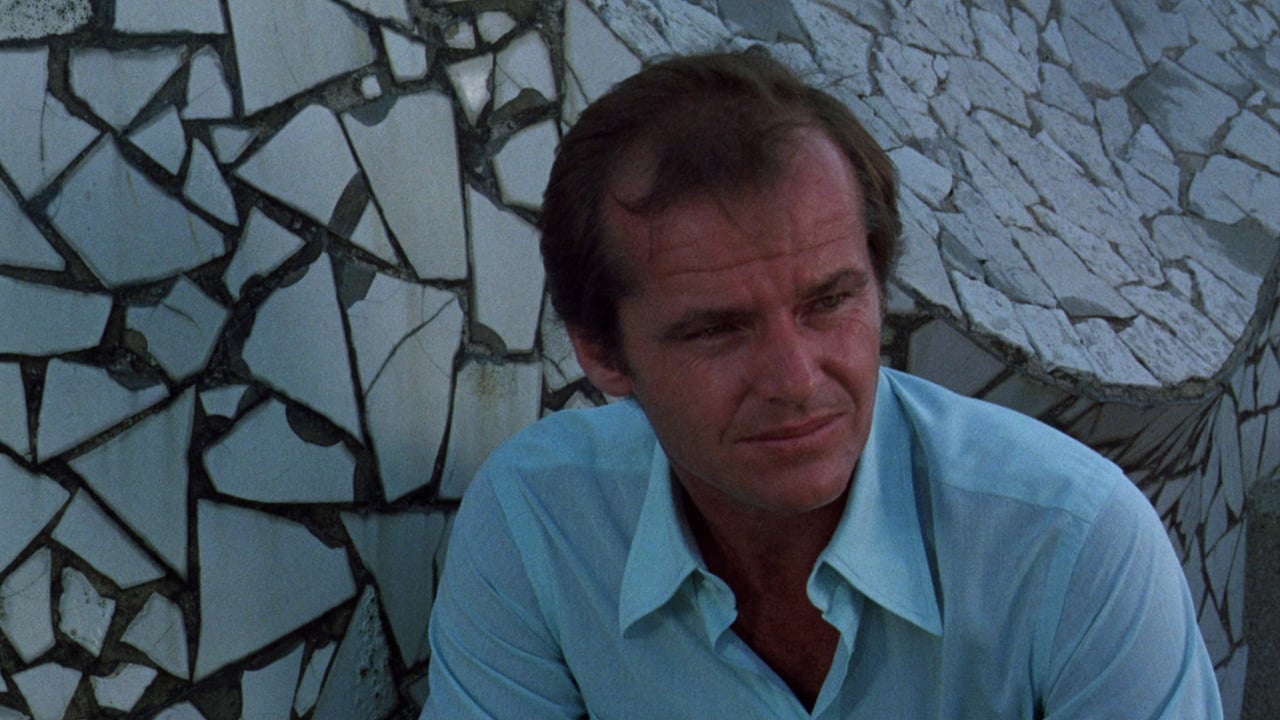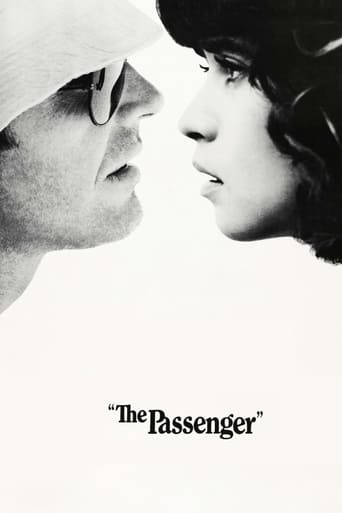

Nicholson fresh off Chinatown walks through this,with one confused expression on his face.The story is about a reporter WHO is having an existential crisis and decides to Exchange identities with an arms dealer he meets at a secluded desert village. The arms dealer dies of a bad heart,and the reporter takes his passport leaving his own on the dead man.From then on he decides to follow the dead mans involvement with a guerrilla Force fighting a corrupt African leader,whom he had personally interviewed.We learn that his wife had criticized him for not standing up to the dictator in the interview. After selling some arms to the guerrillas,he becomes a target of the dictators International assassins.At that point the movie becomes muddled and stupid.Instead of trying to expose the dictators International spy ring and bringing them down using the help of the Police,the reporter is more concerned about escaping his wife and the police so as to keep his fake identity,something not really admirable.In the process he meets a young girl played by Maria Schneider and they both run together as if they were a couple of delinquents. And this goes on and on,through several international European locations and the movie becomes more and more boring.
... View MoreAntonioni's quietly minimalist approach to storytelling has never really resonated all that well with me. In "The Passenger" his style is very much intact, giving us several good settings, two mysteriously interesting characters and some very nice moments of high quality dialog. But all this in a way I found a bit frustrating.Maybe I'm too used to today's direct, explanatory style of storytelling and can't read between all the subtleties, as the overall impression I was left with was one of a diluted movie. Still, this is a very smart thriller that has a very real sense of the unknown in it.
... View MoreThis was the first art film I ever saw, and probably also the first time I'd seen Jack Nicholson. It made a big impression. I'd never seen a film that pondered things like this, gave you opportunity to experience feelings in real-time. I took it that Antonioni invented this sort of movie - possibly even invented the art-movie genre.There's a lot that doesn't add up here. When I see subtle ambiguities, unexplained depths, and especially questions of identity, I immediately look for sexual ambivalence - and often I find it. First, there's the title. Some people think the 'passenger' is Maria Schneider, or that it relates to Nicholson using the dead man's plane ticket. What I get is that Nicholson's hidden, secret, suppressed inner self was a kind of passenger in his own official, external life, the life he didn't want. That indicates only one thing to me. Other clues? He sees his wife later without any pangs of remorse or sentimentality - simply runs away; he has an adopted child (why adopted?); he doesn't expose the lies of the politicians he interviews (saying 'those are the rules'). These may all be extremely subtle hints about the man's secret sexual identity. Sure, he hooks up with tasty gamine Maria Schneider, but that's a smokescreen to puts us off the scent - and there is always a smokescreen because it's essential to the point of the film that no one fully understands it - but note that there was no overt sexual encounter between them - quite significant in its omission. So there you are. It works for me, and if I am right, we are now probably the first people to fully understand what this film is about. So how good is it? We start out in the African desert with a schematic series of silent encounters, miscommunications, words falling flat in the emptiness, the lethargy of heat, a quasi Paul Bowles feel of lurking malice. So far so good. Atmosphere. Images. Metaphor. Meaning. The desert is symbolic and significant - exactly as it was in the life of that that other (married) gay journalist Bruce Chatwin. Then, Nicholson's character switches identity with a dead man (without reason, because it is not expressible), dons a naff seventies brown suit with flared trousers, and we land in a silly intrigue relating to the dead man's job. All those scenes with the gun-runners, the wife, and the television studio boss are redundant and should have been ditched. It's a relief when he and Maria Schneider hit the road because that's when the film really finds itself: illicit freedom, the escape from the person you don't want to be. That ought to have been the key theme throughout and I don't think Antonioni really got to grips with it properly. He was too keen to take us round Gaudi's buildings in Barcelona for one thing.I don't know what Antonioni was thinking of in leaving Italy. Probably he just wanted to be part of a bigger, trendier scene. But whereas Bertolucci found new depth in things like Last Tango in Paris, Antonioni forgot quite a lot of what he knew about cinema: of reality vs silliness, of story vs meaning, of style vs substance. He was like one of those pop singers (Faye Wong comes to mind) who sound great in their own language, but rotten in English.After all these years I'm less impressed with The Passenger than I was before. Antonioni seems to be a man of limited interests (basically two: alienation and architecture), and it's all there is here again. The famous final scene must have been original at the time but now looks vaguely silly. Lots of weak moments, and only a few great ones.
... View MoreMichelangelo Antonioni's 'The Passenger' is Artistic Cinema! Its certainly not meant for everyone, as the story-telling in here, is lethargic & very dim. But for those who have a taste for something very different, they certainly will appreciate it.'The Passenger' Synopsis: A frustrated war correspondent, unable to find the war he's been asked to cover, takes the risky path of co-opting the I.D. of a dead arms dealer acquaintance.I wasn't bored or engrossed by 'The Passenger'. I did find myself interested to it, but only in the parts. The lethargic pacing & the dimness got to me after a point, but I definitely credit the film, for its originality. Michelangelo Antonioni's Direction is dim. Cinematography is high-class. Editing could've been sharper. Performance-Wise: Jack Nicholson aka The God of Acting, delivers a masterful performance, yet again. He infuses life into this otherwise moody film, with his marvelous act. Maria Schneider looks angelic & does well in some scenes. Steven Berkoff is decent. Charles Mulvehill leaves a mark.On the whole, 'The Passenger' caters to a niche audience.
... View More